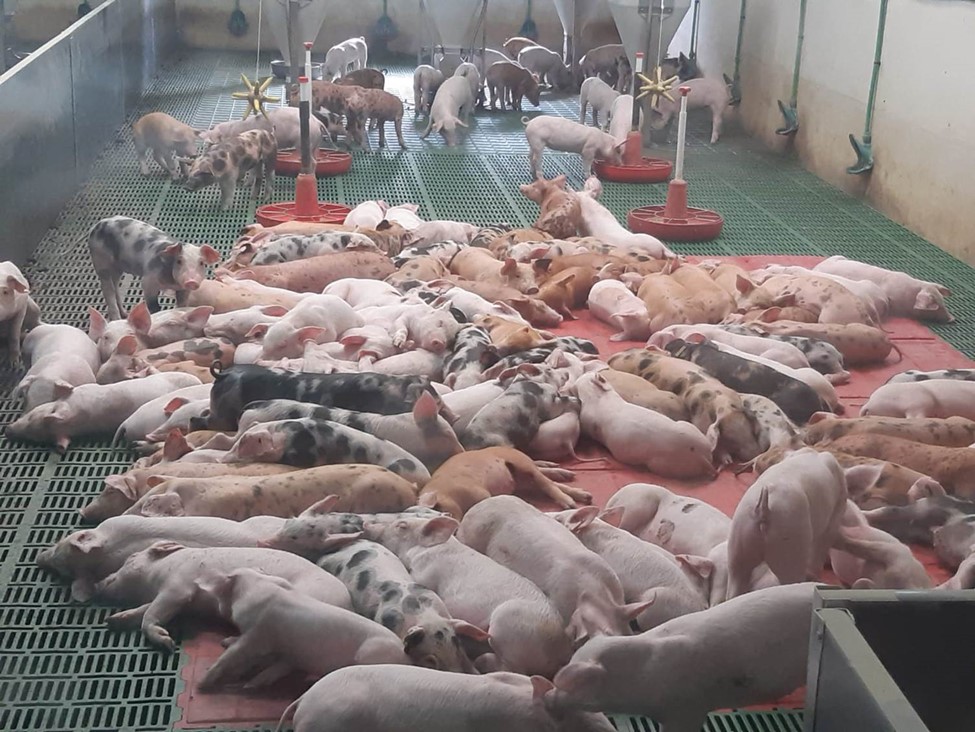



Postcard from Spain: What started as a problem, became an opportunity
A women-owned and managed swine farm in Spain’s Galicia region, Nutrimentos Deza S.A. (NUDESA), is a three-time recipient of the Ministry’s award for the best farm in Spain Porc d’Or.
The integrator’s holistic approach to reducing antimicrobials in its production practices has not only led to industry recognition, but has helped the farm improve key performance metrics, including higher average daily gain, reduced feed conversion rates, and lower variance among animals, writes Javier Roques Mata, Programme Manager Gut Health Swine and Joaquin Llorente De Frutos, Product Manager Swine Trouw Nutrition Spain.
NUDESA’s path to production success hasn’t been without challenges though. In April 2016, a Porcine Epidemic Diarrhea virus outbreak occurred on several of its farms. Problems during the farrowing and suckling phase continued into the nursery, with sudden death and diarrhea as key issues. The company’s management wanted to tackle these problems without resorting to antimicrobials such as antibiotics or zinc oxide and began researching how other innovators were reducing the use of antimicrobials in their herds. This led to a collaboration with Trouw Nutrition and an integrated approach to improve health and performance without antimicrobials.
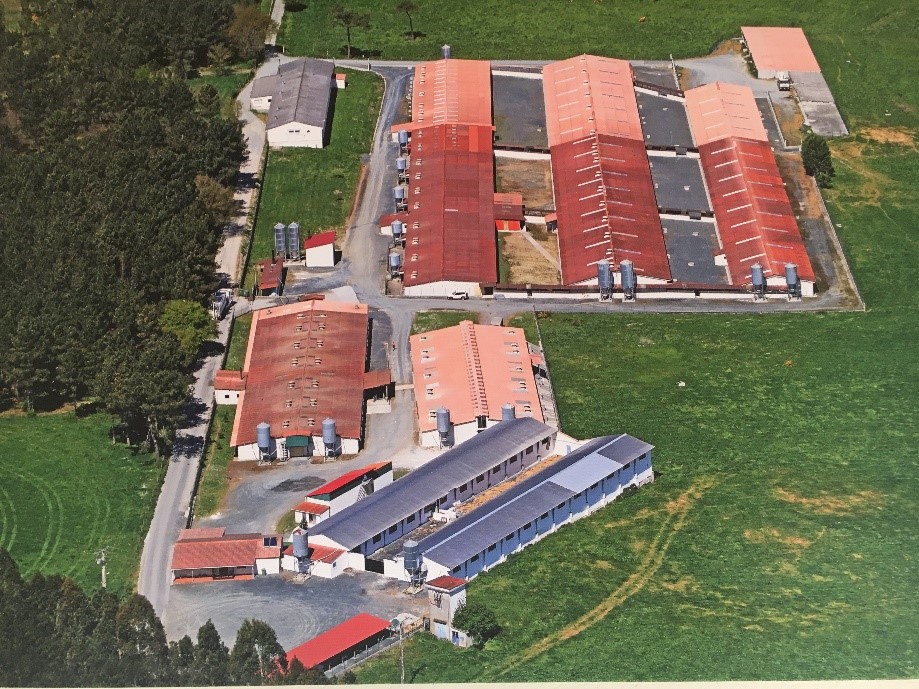
Mar Lara Diaz-Meco, NUDESA’s veterinarian, notes the project was introduced first on the most challenged farms. “We started with digestive pathologies in weaned piglets on the most problematic farms, addressing challenges in a multifactorial way and with an ambitious schedule”, she says. After evaluating results from the first farm pilot, NUDESA management realized what had started as a problem had evolved into an opportunity. Consequently, the gut health program was standardized for implementation on all 10 of the company's farms and also offered to external compound feed customers. Diaz-Meco says: “Implementing the gut health program allowed us to obtain a piglet with more weight at the end of nursery, reducing its variation and the percentage of losses.”
A one-size fits all approach simply isn’t practical when dealing with the nuanced challenges unique to each swine farm. Successful antimicrobial reduction programs must begin with analysis of the specific farm situation and identification of critical control points on the farm. As the analysis uncovers problems on the farm and suggests opportunities for improvement, a custom plan can be tailored, implemented and evaluated. Following is an overview of how this integrated approach was rolled out on NUDESA’s farms.
A customized blueprint starts with assessment: The starting point for NUDESA’s collaboration with Trouw Nutrition was a farm with 450 Duroc-Batellé grandmothers producing hybrids of Duroc x Landrace. Analysis of critical control points revealed a prevalence of Rotavirus A, enterotoxigenic E. coli (STa, STb) and Salmonella Typhimurium in piglets’ faeces. Among other bacteria, Salmonella Typhimurium was isolated in feces of piglets at weaning.
A serology and fecal assessment for Salmonella was made in the farms’ gilts, sows and piglets and included different parities and time points. Among quarantine gilts, Salmonella prevalence and shedding was monitored by serology and fecal isolation and identification in the feces of gilts at entrance and at departure. Analysis suggested a focus on gilts and sows, and showed animals were positive for Salmonella after 4-6 weeks of life. Analyses of animals in housed in quarantine showed the animals turned positive during their quarantine stay. This data informed implementation of a Salmonella control program on NUDESA farms.
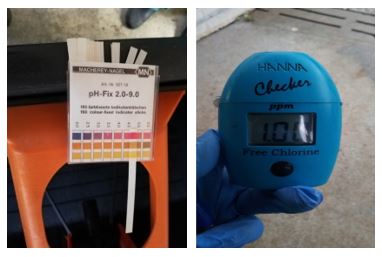
Managing pathogen load: The microbiological and physio-chemical quality of the farm’s water was evaluated across critical control points. Alkalinity and free chlorine levels were measured at the water source, in the tank following treatment, and on drinking nipples. Findings informed dosage of a blend of free and buffered organic acids to achieve an optimal drinking water pH around 4. A lower pH in combination with chlorine inhibited bacteria growth in the water, while the organic acids supported a reduction in stomach pH. In addition to reducing the microbiological load in the stomach, the blend of organic acids also created an extra barrier for Enterobacteriaceae, while supporting protein digestion in piglets. Extra waterlines and water taps were installed, waterline cleaning procedures were enhanced, and systems installed to assure proper dosing of the organic acid blend.
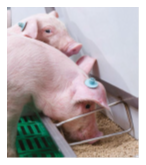
While NUDESA’s feed production was determined to be free from Salmonella, it was important to control gram-negative bacteria inside the animal (i.e. Salmonella spp, E. coli, etc.). Feed additives were introduced in the gestation, lactation and quarantine diets. These additives helped reduce the pH in the first part of the gastro-intestinal tract, thereby creating a higher barrier for Salmonella to colonize inside the animal.
Following implementation of these changes, fecal shedding of Salmonella was negative. Additionally, serology showed sows’ maternal antibodies were higher, protecting young piglets. The presence of Salmonella in older animals (6-8 weeks) was reduced, as well as lower levels in the gilts. Findings indicate a low occurrence of contact with Salmonella spp 3 months after the implementation of the program.
Moving forward with young animal feed: Multiple improvements to protect the health status of young piglets targeted palatability, protein sources with differences in digestibility, amino acid ratios, gut integrity, microbial balance and reducing inflammation.
Feed management changes for suckling piglets aimed to minimize stress, fasting and overloading. The farm’s feed hopper supply was more strictly controlled, and temperature control was achieved by building nests and using thermal blankets to keep piglets warm. Piglets’ weaning age was increased to 28 days, to improve body weight at weaning.
As swine production components are interrelated, any change in feed, farm or health management will impact other areas. A good example of this change effect is the influence a pig’s gut health can have on vaccination efficacy. After feed changes led to improved intestinal health, a trial analyzed the effect of using a vaccine to prevent E. coli F4/F18 in weaned piglets. Vaccinated piglets had a significantly higher body weight at the end of the weaning phase, and mortality was reduced.
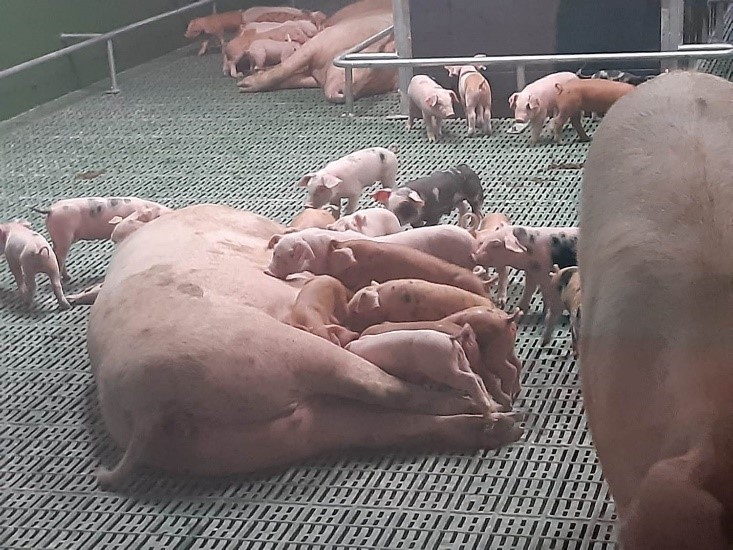
The sow piglet connection: For piglets experiencing digestion problems during lactation, NUDESA’s team and researchers evaluated sows’ gut health and microbiota status. Sows’ fecal samples were collected in different parities and at different moments during gestation and lactation. Every 6 weeks, E. coli/Enterobacteriaceae and Lactobacillus/Clostridium ratios were measured, as indicators of gut health and microbiota status. Products introduced in gestating and lactating-sow diets aimed to improve microbial balance and reduce infection pressure for the suckling piglets, successfully preventing neonatal diarrhea. Ratios were re-measured, to evaluate effectiveness in modulating sows’ microbiota.
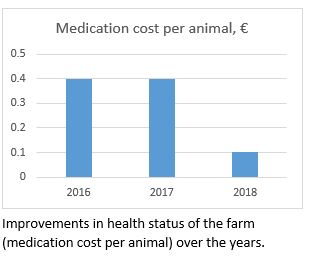
A farm’s climate and disease pressures should also influence management practices. NUDESA’s farms in Galicia
experience abundant humidity and rainfall, posing ventilation and temperature control issues. Problems with Streptococcus suis are common. With these challenges in mind, efforts were made to prevent infection pressure, continuing on the support of sows’ microbiota modulation, and improve ventilation control. Feed strategies aimed to improve gut health and gut integrity in young animals. As these changes were made, the problems of Streptococcus suis occurred less frequently. NUDESA was able to remove antibiotics such as Lincomycin in water and Enrofloxacin as an injectable for digestive pathologies in piglets, as well as the use of Amoxicillin in water during the first two weeks to prevent Streptococcus suis. This improved in health status is reflected in a reduction of medication costs per animal after implementation of the Trouw Nutrition program (Figure 1).
Remarking on the success of this collaborative effort, Salome Fondevila, production manager and co-owner of NUDESA says: ‘In our farms we have achieved both a higher body weight and less variation in the animals as well as an improved health status, and in the clients for our compound feed business we have achieved very good results reinforcing the position of NUDESA with these farms.’
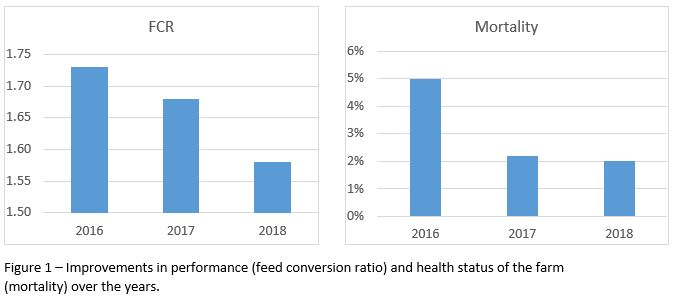
Informing tomorrow’s success: Looking toward the future, Mar Lara Diaz-Meco says, “For NUDESA, it is important to anticipate changes and make this experience available to our customers. We are obliged to work with greater demands on well-being, biosecurity, management and nutrition, while supporting the training of our farmers.”
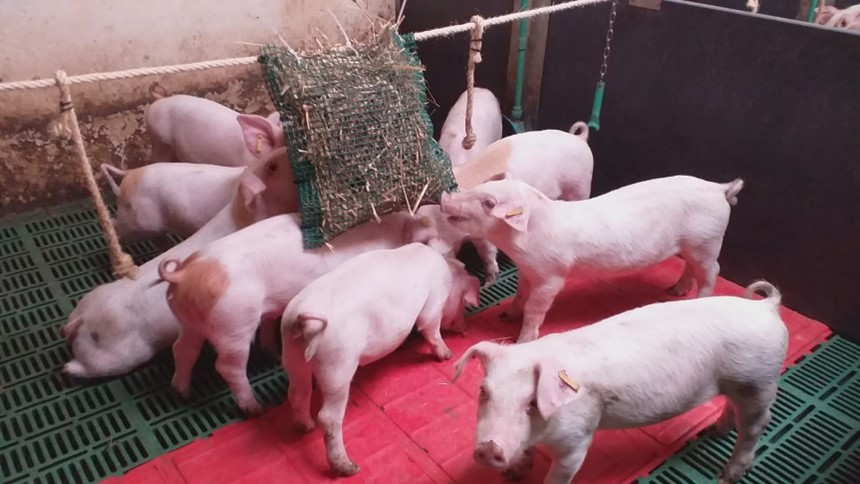
NUDESA is a company preparing for the future. Part of the preparation is conducting trials focusing on replacing high levels of zinc in the pre-starter diets, as the European Union will ban the use of pharmacological levels of zinc in pig production in 2022. Says Ruth Gonzalez; “The future lies in continuing with this line of work, focusing on the total withdrawal of pharmacological levels of zinc, which is already in progress, with very good results, removing amoxicillin, and looking for alternatives to fight Streptococcus suis. We are working with Trouw Nutrition to evaluate different products via water and feed.”
